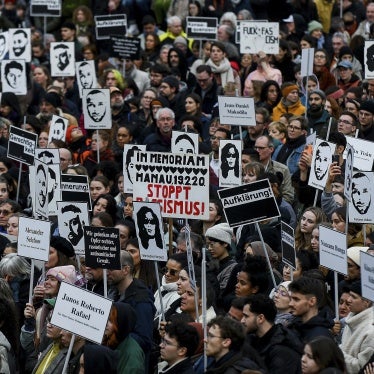(New York) – Human Rights Watch has won the 2008 United Nations Prize for Human Rights, in recognition of the vital role played by the human rights movement in trying to end abuses over the past 60 years, Human Rights Watch said today. The award, given every five years, will be bestowed in New York on December 10, 2008, the 60th anniversary of the Universal Declaration of Human Rights.
“We are proud to accept this prize on behalf of the human rights movement,” said Kenneth Roth, executive director of Human Rights Watch. “Governments are always tempted to violate human rights, but 60 years after the adoption of the Universal Declaration of Human Rights, the human rights movement is now able to ensure that abusers pay a hefty price.”
The United Nations Prize in the Field of Human Rights is given to individuals and organizations in recognition of outstanding achievement in human rights. Among this year’s winners are: Louise Arbour, former UN high commissioner for human rights and a member of the Human Rights Watch board of directors; Dr. Denis Mukwege, who works with victims of sexual violence in the Democratic Republic of Congo; and, posthumously, the former Pakistani prime minister Benazir Bhutto, who was assassinated in December 2007.
“The prize will help Human Rights Watch and our allies in our campaigns to stop the killings in Darfur, to end the use of cluster bombs worldwide, to shut down Guantanamo without effectively moving it onshore, to free child soldiers from military servitude, and to protect civilians during armed conflict,” Roth said. “By raising the cost of abuse, we make governments think twice about violating the rights of their people. In the process, we save lives and promote fundamental freedoms.”
Human Rights Watch, which is celebrating its 30th anniversary, is an independent, nongovernmental organization, supported by contributions from private individuals and foundations worldwide. It accepts no government funds, directly or indirectly. Some 280 professionals work for Human Rights Watch, investigating and exposing abuses in more than 80 countries. Human Rights Watch is a leading member of the International Campaign to Ban Landmines, which won the 1997 Nobel Peace Prize.
Human Rights Watch was founded in 1978 as Helsinki Watch, set up to monitor the compliance of Soviet bloc countries with the human rights provisions of the landmark Helsinki Accords. In the 1980s, Americas Watch was created to investigate abuses by authoritarian regimes in Central America, challenging theories expounded by the Reagan administration at the time that rights violations committed by one form of government were somehow more tolerable than those committed by another. “Watch committees” were added in Africa, Asia and the Middle East, and the five committees began using the common name Human Rights Watch in 1988.
Human Rights Watch is headquartered in New York, with offices in Berlin, Brussels, Chicago, Geneva, Johannesburg, London, Los Angeles, Moscow, Paris, San Francisco, Tokyo, Toronto, and Washington, DC. Human Rights Watch tracks developments in more than 80 countries around the world and has programs on women’s rights, children’s rights, terrorism and counterterrorism, the use of abusive weapons in warfare, HIV/AIDS, the rights of lesbian, gay, bisexual and transgender people, the human rights responsibilities of corporations, international justice, and refugees.
Over the past 30 years, Human Rights Watch has helped to advance respect for human rights, including by:
· leading an international coalition to press for the adoption of a treaty banning the use of child soldiers;
· documenting abuses by the United States in the “war on terror,” including the CIA’s secret detention, interrogation and rendition program, the torture of detainees held in Iraq, Afghanistan and Guantanamo, and unfair trials at Guantanamo;
· working to achieve a comprehensive treaty banning antipersonnel land mines;
· documenting violations of the laws of war in numerous conflicts, including Afghanistan, Bosnia, Chechnya, Colombia, Democratic Republic of Congo, Kosovo, Georgia, Israel and the Occupied Palestinian Territories, Iraq, Lebanon, Somalia, and Sudan;
· working with international war crimes tribunals and providing evidence of abuses leading to convictions of officials from the former Yugoslavia and Rwanda;
· helping focus attention on abuses in China ahead of the 2008 Olympic Games; and
· documenting the killing and maiming of civilians by cluster munitions in Kosovo, Afghanistan, Iraq, Lebanon, and Georgia, and helping to bring about the international treaty ban.
“We call on all governments, including the United States, to sign the new cluster munition ban treaty in December,” said Roth, who will be in Oslo ahead of the December 3 signing ceremony.








